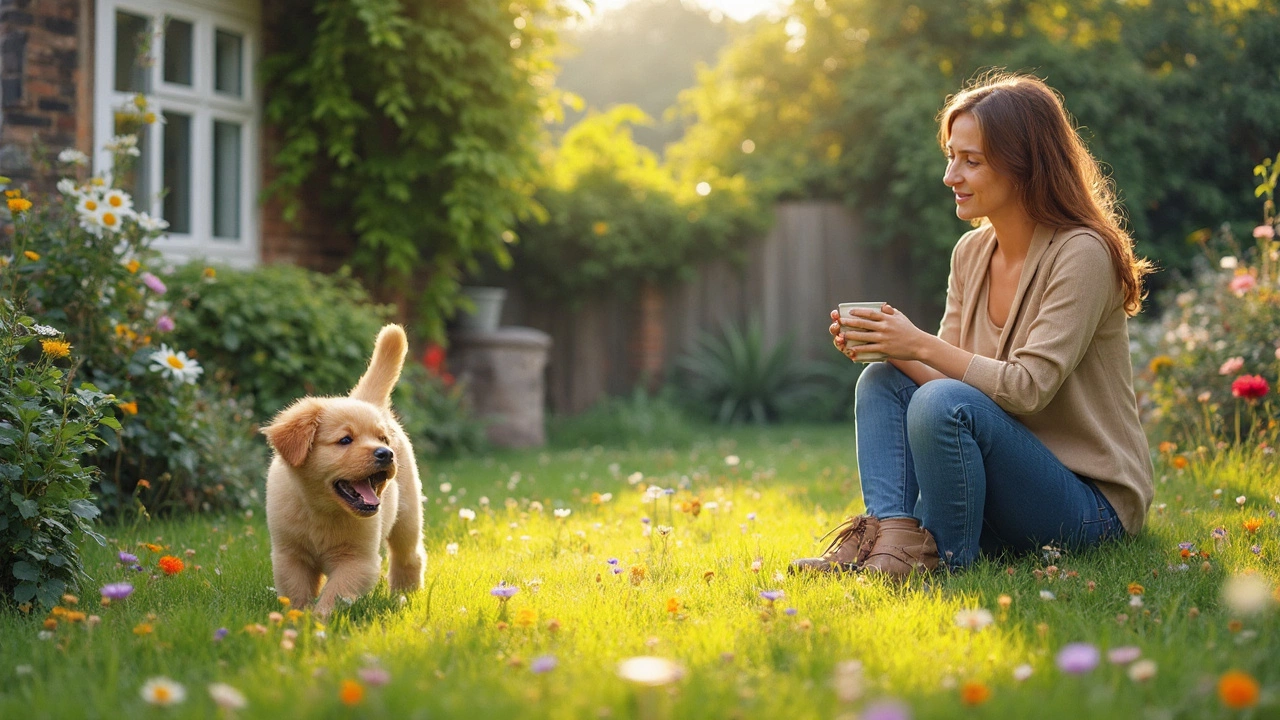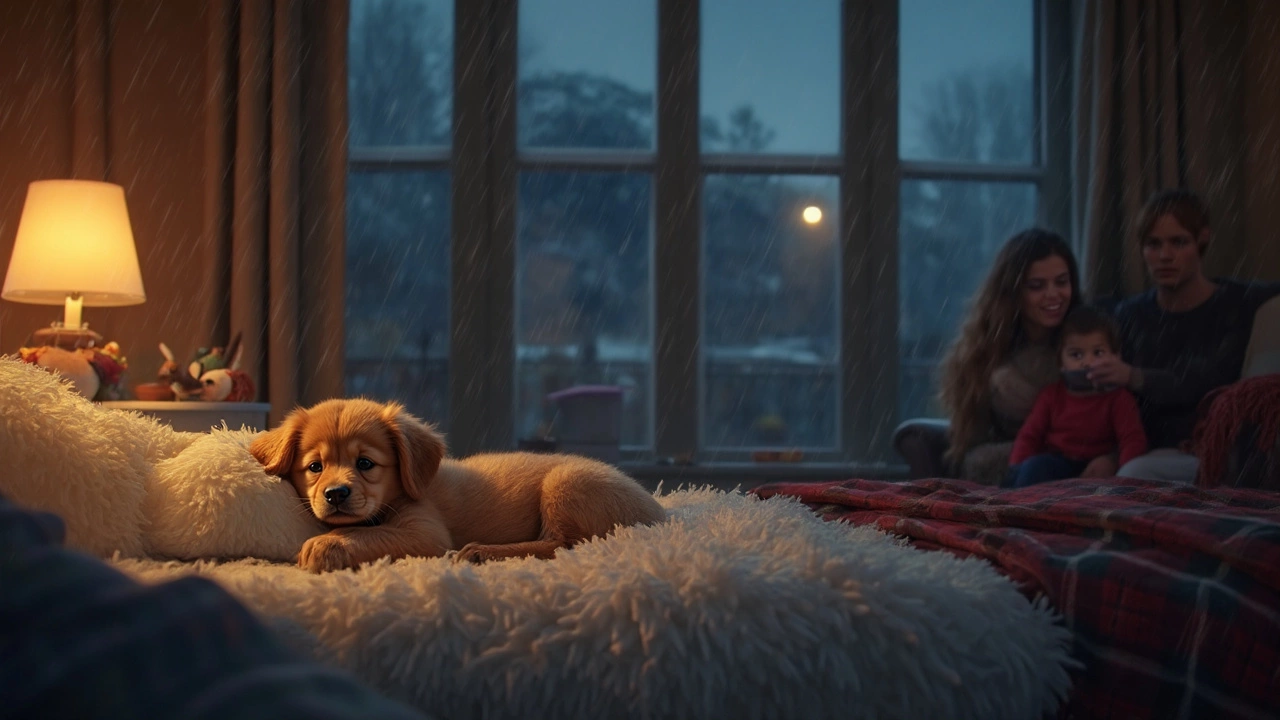If your puppy keeps waking you up at 3 a.m. for a bathroom run, you’re probably wondering—is it normal, or am I spoiling them? Here’s the thing: puppies don’t have the bladder control of adult dogs. Tiny bladders fill up fast, especially for young pups, and that means accidents are pretty much guaranteed if you try to skip those nighttime breaks too soon.
So yes, most puppies under 4 months old do need to go out at least once during the night. Their bodies just can’t ‘hold it’ for eight hours like grown dogs. Waiting until morning usually ends in wet bedding and lots of frustration for everyone involved. That’s not good for house training, and it’s stressful for your puppy too.
Most puppy parents find it’s easier to set a gentle alarm for a quick nighttime potty trip than to deal with messy cleanups in the morning. Plus, those quick, boring trips (no playtime, no snuggles—just business!) help your pup learn the routine and start developing bladder control, step by tiny step.
- How Puppies’ Bladders Really Work at Night
- Should You Set Alarms? What Age and Breeds Matter
- Night Potty Tips That Actually Help
- When to Stop Nighttime Potty Breaks
How Puppies’ Bladders Really Work at Night
This can surprise new puppy care folks: a two-month-old puppy’s bladder is about the size of a large walnut. That means it won’t hold much, not even for a whole movie, let alone a full night.
Puppies usually need to pee every 2-4 hours when they’re super young. A well-known rule is that a puppy can “hold it” for about one hour for every month of age—so a three-month-old can last around three hours, sometimes a little longer at night when they’re fully asleep. But there’s no magic off-switch for their need to go!
| Puppy Age | Average Nighttime Hold |
|---|---|
| 8 weeks | 2-3 hours |
| 12 weeks | 3-4 hours |
| 16 weeks | 4-5 hours |
Sleep cycles matter too. Puppies sleep deeply for short stretches, then wake up and become restless. When they stir, that’s usually a sign that their bladder is screaming for attention. Unlike adult dogs, they can’t wake up and “decide” to wait just because you want more sleep.
Smaller breeds struggle even more because of their tiny size. If you have a Chihuahua or a Yorkie, expect more frequent breaks. Bigger breeds still need bathroom trips, just not as often.
Here’s your takeaway: no puppy is trying to be a troublemaker or ruin your sheets. Their bladder just isn’t built for all-night holds. That’s why good puppy potty training means working with your pup’s biology, not against it.
Should You Set Alarms? What Age and Breeds Matter
Here's the real talk: not every puppy is the same, and puppy potty training needs depend a lot on age and breed size. Young puppies just don’t have the muscle power to make it all night. Most 8-week-old pups can only hold it for about two to three hours. That means if you’re not setting an alarm, you’re basically rolling the dice on whether your floors stay clean.
There’s a helpful thumb rule: add one to the puppy’s age in months for the number of hours they might last overnight. So an 8-week-old (that’s 2 months old) may last about 3 hours before needing a potty break. Here’s how that could look for common age ranges:
| Puppy Age | Likely Max Hold (Hours) |
|---|---|
| 8 weeks | 2-3 |
| 12 weeks | 3-4 |
| 16 weeks | 4-5 |
| 20+ weeks | 5-6 |
Breed plays a big part too. Tiny breeds like Chihuahuas or Yorkies have bladders the size of a walnut—seriously, don't expect miracles. Bigger breeds, like Labs or Goldens, usually manage longer stretches earlier than the little guys. But don’t assume your Labrador puppy can always sleep through the night at 10 weeks, either. Individual puppies are like people: some are champs early, others take more time.
If your pup is waking you up before the alarm goes off, that’s not mischief—it’s just nature calling. Don’t ignore it. But if your puppy has a dry crate at 4 a.m., you can try slowly pushing the next potty break a little later each night. This teaches them to hold it, bit by bit, and keeps housebreaking tips on track.
Quick recap on alarms: for most puppies under 16 weeks old, yes, set the alarm at first—especially for the smaller breeds. If you’re lucky and have a sound sleeper, you can experiment with longer stretches as they age (and your own sleep schedule will thank you).

Night Potty Tips That Actually Help
If you want better sleep and fewer accidents, you need a clear plan for those late-night puppy potty training breaks. Here’s what actually makes a difference when it’s pitch black and you’re half-awake.
- Get a bedtime potty routine: Always take your puppy out right before bed, no matter how tired you are. This simple step can add 1-2 extra dry hours to your night.
- Stick to a schedule: For very young pups (under 12 weeks), set an alarm for every 2 to 3 hours. As your pup gets older, you can slowly stretch the time between breaks. Small breeds sometimes need even more frequent trips at first.
- Keep it boring at night: Don’t turn the trip into playtime. No tossing toys, no extra cuddling. Say your potty cue (“Go potty!”), praise quietly if they go, and march straight back to bed. This keeps the focus on business and not on late-night fun.
- Prep your potty path: Have leashes, slippers, and poop bags ready near the door. The faster you get outside, the less likely your puppy is to get distracted or confused.
- Limit water in the evening: Don’t remove water completely, but try to pick up their bowl about 2 hours before bedtime. This helps cut down on how much they’ll need to pee at night, but don’t let your puppy get dehydrated.
Want a quick cheat sheet? Here’s a handy guide for maximum hold times based on puppy age. These numbers aren’t perfect for every dog, but they’ll give you a realistic starting point:
| Puppy Age | Average Nighttime Hold |
|---|---|
| 8 weeks | 2-3 hours |
| 12 weeks | 3-4 hours |
| 16 weeks | 4-5 hours |
| 6 months | Usually through the night |
This kind of sleep schedule helps you stay ahead of accidents. Remember, every puppy is different—some need more help, others can last a bit longer. If your puppy sleeps in a crate, most will try to hold it longer to avoid soiling their space, but don’t bet your sheets on it just yet!
When to Stop Nighttime Potty Breaks
This part is what every tired puppy parent wants to know: When do you finally get your full night of sleep back? The answer depends on your puppy's age, breed, and even their health. In general, most puppies can start sleeping through the night without a night routine potty break by the time they're about 16 weeks old—sometimes a little sooner, sometimes later for smaller breeds.
The magic number for holding it is about one hour for every month of age. So, a three-month-old puppy can usually hold it for around three to four hours at night, while a four-month-old might manage up to five hours. But don't expect dramatic, overnight improvements—just watch for steady progress.
- If your puppy consistently wakes up dry for several nights, it’s a solid sign they’re ready to try skipping the nighttime trip.
- If you find the crate or bedding soaked in the morning, back up and stick to your puppy potty training night schedule a bit longer.
- Watch for changes: eating late, drinking more, or growth spurts can all mean they briefly need that extra midnight break again.
Small breeds and toy dogs are famous for tiny bladders, so don’t be surprised if your chihuahua or Yorkie needs extra weeks. Some large breeds seem ready to sleep straight through at 12 weeks, but don’t rush it—the last thing you want is a big accident that sets back your housebreaking tips.
Here’s a quick cheat sheet to get a sense of when you can expect true overnight success:
| Puppy Age | Average Nighttime Hold (Hours) |
|---|---|
| 8 Weeks | 3-4 |
| 12 Weeks | 4-5 |
| 16 Weeks | 6-7 |
| 20+ Weeks | 7-8 (full night) |
Keep your puppy care routine consistent, and watch your puppy’s signals. Celebrate dry mornings (quietly, so you don’t wake the whole house), and know you’re almost at the light at the end of the tunnel. Once they hit the mark for at least a week, go ahead and ditch that middle-of-the-night alarm—your bed will thank you.
